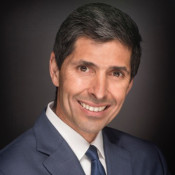 Michael Santos of PrisonProfessor made bad decisions as a young man. In 1987, authorities arrested him for trafficking in cocaine and he served the next 26 years in federal prison. While incarcerated, Michael vowed to work toward reconciling with society. He adhered to a three-pronged plan that required him to educate himself, contribute to society, and build a strong support network. That values-based, goal-oriented approach empowered him. He earned university degrees, became a published author, and married the love of his life while serving multiple decades in prison. He now builds a career teaching others how they can achieve their highest potential, regardless of external forces or current circumstances.
Michael Santos of PrisonProfessor made bad decisions as a young man. In 1987, authorities arrested him for trafficking in cocaine and he served the next 26 years in federal prison. While incarcerated, Michael vowed to work toward reconciling with society. He adhered to a three-pronged plan that required him to educate himself, contribute to society, and build a strong support network. That values-based, goal-oriented approach empowered him. He earned university degrees, became a published author, and married the love of his life while serving multiple decades in prison. He now builds a career teaching others how they can achieve their highest potential, regardless of external forces or current circumstances.
Listen to the podcast
Show Highlights
- Michael tells us that as he was completing his sentence he had three expectations for himself:
- Educate himself
- Contribute to society
- Build a support network for after release
- Michael created a plan to be a “Straight A” citizen that included the following steps
- Articulate your values and have clear goals
- Attitude – 100% counts
- Aspiration
- Action Steps
- Accountability
- Awareness
- Achievement – Celebrate everything even the little things.
- Appreciation – Express gratitude
Favorite Books:
- What Got You Here Won’t Get You There: How Successful People Become Even More Successful
America’s most sought-after executive coach shows how to climb the last few rungs of the ladder.
The corporate world is filled with executives, men and women who have worked hard for years to reach the upper levels of management. They’re intelligent, skilled, and even charismatic. But only a handful of them will ever reach the pinnacle — and as executive coach Marshall Goldsmith shows in this book, subtle nuances make all the difference. Earning Freedom
During the 26 years that Michael G. Santos served as a federal prisoner, he worked consistently to prepare for a law-abiding, contributing life upon release. His disciplined and deliberate adjustment strategy led Michael to earn both a bachelor’s degree and a master’s degree while he served decades in prisons of every security level. Prior to the completion of his sentence Michael secured a position as a lecturer at San Francisco State University; he teaches a course titled The Architecture of Imprisonment, CJ 451 and readers may link to the syllabus from Michael’s website. He uses his books as teaching resources for the course at San Francisco State University and to work toward helping others understand the complexities of American’s prison system. Besides teaching, Michael works a speaker and consultant, helping others embrace strategies to conquer adversity.
The Republic
The Republic is a Socratic dialogue, written by Plato around 380 BC, concerning the definition of justice, the order and character of the just city-state and the just man—for this reason, ancient readers used the name On Justice as an alternative title. It is Plato’s best-known work and has proven to be one of the most intellectually and historically influential works of philosophy and political theory. In it, Socrates along with various Athenians and foreigners discuss the meaning of justice and examine whether or not the just man is happier than the unjust man by considering a series of different cities coming into existence “in speech”, culminating in a city called Kallipolis, which is ruled by philosopher-kings; and by examining the nature of existing regimes. The participants also discuss the theory of forms, the immortality of the soul, and the roles of the philosopher and of poetry in society.
Four Texts on Socrates: Plato’s “Euthyphro,” “Apology of Socrates,” “Crito,” and Aristophanes’ “Clouds”
Crito is a dialogue by the ancient Greek philosopher Plato. It is a conversation between Socrates and his wealthy friend Crito regarding justice, injustice, and the appropriate response to injustice. Socrates thinks that injustice may not be answered with injustice, and refuses Crito’s offer to finance his escape from prison. This dialogue contains an ancient statement of the social contract theory of government. The dialogue takes place in Socrates’ prison cell, where he awaits execution. He is visited before dawn by his old friend Crito, who has made arrangements to smuggle Socrates out of prison to the safety of exile. Socrates seems quite willing to await his imminent execution, and so Crito presents as many arguments as he can to persuade Socrates to escape. Socrates introduces the voice of the Laws of Athens, which speaks to him and proceeds to explain why it would be unjust for him to leave his cell. Since the Laws exist as one entity, to break one would be to break them all, and in doing so, Socrates would cause them great harm. The citizen is bound to the Laws like a child is bound to a parent, and so to go against the Laws would be like striking a parent. Rather than simply break the Laws and escape, Socrates should try to persuade the Laws to let him go. These Laws present the citizen’s duty to them in the form of a kind of social contract. By choosing to live in Athens, a citizen is implicitly endorsing the Laws, and is willing to abide by them. Socrates, more than most, should be in accord with this contract, as he has lived a happy seventy years fully content with the Athenian way of life. If Socrates were to break from prison now, having so consistently validated the social contract, he would be making himself an outlaw who would not be welcome in any other civilized state for the rest of his life. And when he dies, he will be harshly judged in the underworld for behaving unjustly toward his city’s laws. Thus, Socrates convinces Crito that it would be better not to attempt an escape.
Thanks for Listening
This information is coming to you to inspire you and drive you forward. Be bigger than you know yourself to be! If you haven’t already done so, please take a minute to leave a quick 5-star review rating and honest review on iTunes by clicking here.
Miranda McCroskey – host of Lawpreneur Radio



 057: Jennifer Lynn Robinson of Purposeful Networking discusses building networks and relationships
057: Jennifer Lynn Robinson of Purposeful Networking discusses building networks and relationships 139: Jibit Cinar of Cepkinian-Cinar Law Group discusses why going solo is the absolute best choice for the female professional who is also a wife and mother.
139: Jibit Cinar of Cepkinian-Cinar Law Group discusses why going solo is the absolute best choice for the female professional who is also a wife and mother. 072: Carolyn Rosenblatt of AgingParents.com discusses aging parents and aging clients
072: Carolyn Rosenblatt of AgingParents.com discusses aging parents and aging clients 144: Garrett Clance of Meritus Payment Solutions discusses Merchant Processing with us.
144: Garrett Clance of Meritus Payment Solutions discusses Merchant Processing with us.
Leave a Reply